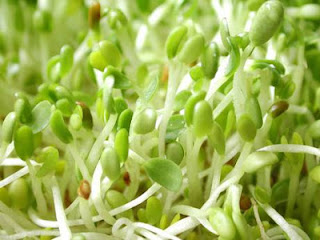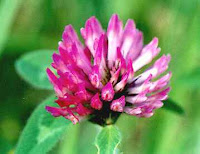Flowers - the Universe. The Earth, Clouds- the Skies... Sunrise!
Today I'm going to talk about sprouts. Sprouts are best known as being a green addition to sandwiches, yet they can be used for almost anything, really. To top off a raw soup- or add to your salad for a little extra crunchiness- or even in raw lettuce wraps. Delicious. However, the health benefits and nature of these little 'buggers' are widely unknown, disputed/controversial.
Being that they are mere seedlings of mature plants/they have not grown up to their fully nutritive state- I don't think they are any better then their grown-up versions. Yet, they are special in their own magical ways.
They are kind of like a luxury actually- I mean, can you imagine someone taking a handful of seeds back in the day to just sprout and eat? Maybe. However, in this day and age it is indeed a luxury to have seeds at your disposal in this way. That will have to change! (http://www.EqualMoney.org)
Anyway, you can have a lot of fun growing sprouts- from watching them grow each day, to 'harvesting' them, to then enjoy crunching down on these tasty morsels as you desire. ;)
However, before you buy any seeds, or growing supplies, there is one thing you should consider before you buy- what is best!
The best sprouts for eating raw- are as follows, which Frederic lays out practically on his webpage, @ http://www.fredericpatenaude.com/questions/sprouts.html ...
"First, I would like to say that I generally do not recommend the consumption of bean sprouts, except very rarely and in small quantities. Bean sprouts still contain a large amount of raw starch which is very difficult to digest. They also contain a number of enzyme inhibitors which makes them very hard to digest. For more information on the subject, please see my book The Raw Secrets. The kinds of sprouts that I recommend are the green sprouts, which are seeds that have fully sprouted into a small plant. Those include: sunflower greens, alfalfa, clover, fenugreek (in small quantities), and other sprouts that have a green leaf. Those sprouts can be considered vegetables and can be combined as vegetables. You can eat them as often as you desire."Below, I have laid out lots of various pictures w/ regards to Sprouts. It is clear to me now that one can use virtually any seeds to grow sprouts - from cucumbers and celery, - to cabbage and romaine lettuce. It's all good! You can use any Non-GMO variety of seeds- and sprout them! I'd love to hear about it if you do. :-) I'll update ya'll when I get the opportunity to do this myself. Yum! I'm inspired to make a Raw Salad now- which will include: Sprouts, Cucumber, Lemon, Avocado, Bell Pepper, and Tomato! Sounds delicious to me! Update: I'm soaking what I've got- as 1 tbsp. Quinoa and 1 tbsp. Lentils. Heh. :-)
 |
| http://www.rawfoods-livingfoods.com/sunflower-sprouts.html How to Grow Sunflower Sprouts from whole Sunflower Seeds |
 |
| Alfalfa Blooms http://givinghealth.blogspot.com/2012/07/theres-more-to-alfalfa-than-its.html?showComment=1357869258183#c8617346909277798446 |
 |
| Alfalfa Leaves http://www.herbalextractsplus.com/alfalfa-leaf.html |
 |
Alfalfa Sprouts |
 |
| Alfalfa: Herbal Remedies http://health.howstuffworks.com/wellness/natural-medicine/herbal-remedies/alfalfa-herbal-remedies.htm |
 |
| Broccoli Sprouts |
 |
| Broccoli |
 |
| Fenugreek http://en.wikipedia.org/wiki/Fenugreek |
 |
 |
 |
| Mature Fenugreek |
 |
| http://www.heirloom-organics.com/guide/va/1/guidetogrowingredcloversprouts.html |
 |
| Red Clover Production |
 |
 |
| Red Clover Sprouts |
 |
| Guide On How To Sprout: http://www.noveleats.com/frugaleats/growing-sprouts/ |
 |
| http://healthyhomegardening.com/Plant.php?pid=1214 |
 |
| Red Clover; Link |
 |
| http://www.herbalextractsplus.com/red-clover.html |
 |
| Radish Sprouts |
 |
| Reddish Radishes http://recipes.wikia.com/wiki/Radish |
 |
| Learn & Grow; Link |
 |
| The Sprout People; Rad-ish. |
 |
| Radish - Botany - Link |
"• Grow your own sprouts and indoor greens, to get some super-fresh vegetables to add to salads."
and:
" Sprouts contain toxins but like Gabriel Cousens mentioned, the risks are minimal in small quantities. I’m opposed to Buckwheat greens because of a very strong toxin contained in them. Read more about it here:
http://www.gillesarbour.com/buckwheatArticle.php"
As explained in my book The Raw Secrets and other articles I've published:
- There are certain toxins in sprouts, so it's best to eat them in small quantities
- Avoid uncooked bean sprouts (except fully grown mung beans as found in Asian markets), because of enzyme inhibitors
- Avoid grain sprouts (sprouted wheat, etc.) because of raw starch
- The best sprouts to eat are sunflower greens, clover sprouts, pea shoots, etc.
- Avoid uncooked bean sprouts (except fully grown mung beans as found in Asian markets), because of enzyme inhibitors
- Avoid grain sprouts (sprouted wheat, etc.) because of raw starch
- The best sprouts to eat are sunflower greens, clover sprouts, pea shoots, etc.
Sprouts are not necessary for health. We can get all the vitamins and minerals from greens. However, if you like them you can eat them but not in large quantities.
https://fredericpatenaude.zendesk.com/entries/130212-your-opinion-on-all-sprouts
https://fredericpatenaude.zendesk.com/entries/130212-your-opinion-on-all-sprouts
That about wraps up the sprout 'business', but wait, actually there is something else.
 |
| Nutritional Info: http://sacredsourcenutrition.com/sprouting-good-health/ |
The Sprouts Business. Nothing against it- but when you can easily/inexpensively grow your own sprouts for a fraction of the price of buying sprouts grown somewhere else, why wouldn't you?
 All you need are some seeds-
All you need are some seeds- which can be found at Natural Grocers by Vitamin Cottage -- and a (sprouting) jar, from the store, or you can make that, too! As you can see to the right we have a Mason jar- with a cheesecloth mesh to drain the sprouts- instead of a complete lid. A rubber band will work just as well as a lid. You can also outfit a mason jar with a metal mesh, which is sturdier. I myself have a NOW jar from Vitamin Cottage/Natural Grocers that works well- except the sprouts tend to spoil before you can eat them all. Next time I try sprouting, I will try using a food grade hydrogen peroxide dilution to rinse/soak the sprouts- killing any microorganisms that cause spoilage. Probably coming from my HANDS, actually. Go figure.
Here's my blog about the Miracle of Hydrogen (H2O2) Peroxide: Hydrogen Peroxide as an Alternative. ~ Check it out!
Some contraptions also have a function of tipping the jar down. This would be handy in keeping the sprouts nice and crisp without all the moisture being stagnant- which makes them soggy. I stick my jar tilted downwards in a large glass bowl, for optimal drainage.
 |
| Comprehensive Sprouting Guide: http://sproutingseeds.go-6.com/ |
When you grow them yourself- consider keeping your mason jar tilted down, and using hydrogen peroxide to rinse them. This will prevent your sprouts from stinking/going bad. Don't eat them if they stink or are wilted.
Heads up: I believe you can also use a mesh strainer and a large bowl, instead of a jar- which would be great for keeping the seeds/sprouts aerated, after you soak/rinse them. What a concept!
When your sprouts are good to go, you can place dry sprouts in the refrigerator in a sealed baggie. They only stay fresh for so long, so eat them, asap.
& Look into Hemp sacks, too -- if your interested, They are said to work well.
Heads up: I believe you can also use a mesh strainer and a large bowl, instead of a jar- which would be great for keeping the seeds/sprouts aerated, after you soak/rinse them. What a concept!
When your sprouts are good to go, you can place dry sprouts in the refrigerator in a sealed baggie. They only stay fresh for so long, so eat them, asap.
& Look into Hemp sacks, too -- if your interested, They are said to work well.


























No comments:
Post a Comment